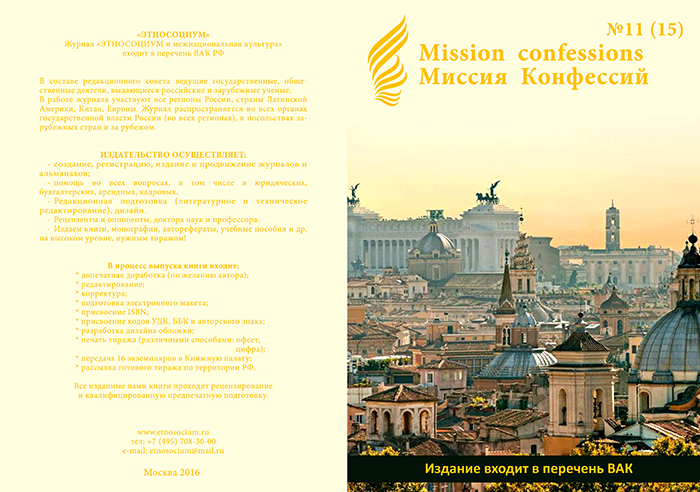Content
|
CONFERENCE
|
6
|
|
PHILOSOPHY, SOCIOLOGY AND CULTURE
|
|
|
Archpriest Dmitri Leskin Do Russian idea alive? Memory of Panarin A.S.
|
9
|
|
Matushanskaya Y.G., Mahmutova M.N. Features of formation of the roman-byzantine law and its influence on the formation of the ecclesiastical law
|
21
|
|
Pleshchitser M.Y. The destructive social phenomenon as a complex social problem
|
28
|
|
Afanasiev S.G. The naturalistic-biologizing tendency and absolutisation of unconscious in western empathy theories of art creativity
|
36
|
|
RELIGION AND SOCIETY
|
|
|
Beysenbin K.A. Issues of Interreligious Cooperation in Modern Russia
|
49
|
|
Bredihin A.V. Doukhobors in the system of international relations between Georgia and the Russian Federation
|
53
|
|
Galaganova S.G. “Thirst after righteousness” in the unrighteous world: the idea of justice and interconfessional christian dialogue
|
59
|
|
Sufism: safety for people and the stability of States
|
67
|
|
Mark Zuckerberg has presented the Pope online drone and donated $ 500 thousand for the victims of the earthquake
|
69
|
|
Abstracts
|
70
|
|
Authors
|
72
|
Abstracts
Matushanskaya Y.G.
Mahmutova M.N.
Features of formation of the roman-byzantine law and its influence on the formation of the ecclesiastical law
The article is devoted to problems of relationship between church and state to those basics on which this relationship is built. The legal sources providing a new view at cooperation of these two institutes are considered in the article. The analysis of these relations allows to make a conclusion that concrete legal mechanisms represent the essence of the theory of “the symphony of the authorities”. Secondly, the analysis of the problems which arose in the Roman legal system and promoted connection between the state and church is done. Also Biblical model of the power, the basis of which was the statement and division of two authorities, is considered. This theory became one of the main reasons of rapprochement of church and the state. Thus, the article displays important aspects of functioning of church and state.
Keywords: state and church relations, Roman law, symphony of the authorities, Justinian’s codification, Constantine the Great.
Pleshchitser M.Y.
The destructive social phenomenon as a complex social problem
The article describes the essence of such destructive social phenomenon as domestic violence against children as a complex social problem, describes the features of the formation of destructive violent components in social interactions on the example of domestic violence against children.
Keywords: dominance, authority, enforced component, the concept of “violence”, domestic violence against children, the cycle of violence, justification of violence, responses to violence, aggression, consequences of violence, physical violence, sexual violence, material violence, psychological and emotional abuse, “secondary victimize, complex violence.
Afanasiev S.G.
The naturalistic-biologizing tendency and absolutisation of unconscious in western empathy theories of art creativity
In the article the positions of conscious and unconscious with reference to elements of art creativity are considered. In a modern science it is important for formation of contours of the uniform scientific law – “The General Law”.
Keywords: empathy, theory, art, suggestion, projection and introjection, reductionism and psychophysical parallelism.
Beysenbin K.A.
Issues of Interreligious Cooperation in Modern Russia
The article analyses the issues of interreligious cooperation within the search of ways to break moral and ethical deterioration of modern Russian society.
Keywords: religion, moral, interreligious cooperation, democracy, ideological pluralism, business elite, illicit gain.
Galaganova S.G.
“Thirst after righteousness” in the unrighteous world: the idea of justice and interconfessional christian dialogue
The idea of justice (“the Rightеousness of God”), described as a basic Christian value and ethical standard, is argued to acquire particular significance in the interconfessional dialogue. It is also argued to be of great importance for the problem of bringing social life patterns in accordance with the Gospel commandments.
Keywords: Christianity, Orthodox Christianity, confessions, interconfessional dialogue, values, justice, social justice, righteousness, Righteousness of God.
Authors
Afanasiev S.G., Candidate of Philosophical Sciences, Doctoral student of Lomonosov Moscow State University, Faculty of Philosophy, Department of Aesthetics, Chairman of the Board of the International Union of Public Associations “World Perspective” (UN and UNESCO programs).
Archpriest Dmitri Leskin, Member of the Public Chamber of the Russian Federation, President of Povolzhskiy Orthodox Institute, Head of Orthodox Classical Grammar School, Doctor of Philosophical Sciences.
Beysenbin K.A., Candidate of Political Sciences, Senior Lecturer in the ‘State and municipal management’ of Smolensk branch of Federal State-Funded Educational Institution of Higher Vocational Education, Russian Presidential Academy of National Economy and Public Administration.
Bredihin A.V., Candidate of Historical Sciences, Senior Researcher of the Center Political Studies, Researcher of the Center of development and modernization of Primakov National Research Institute of World Economy and International Relations.
Galaganova S.G., Bauman Moscow State Technical University, Department of Information Analysis and Political Technologies, Candidate of Philosophical Sciences, Associate Professor.
Mahmutova M.N., Master of Religious Studiesб KFU.
Matushanskaya Y.G., Doctor of Philosophical Sciences, Associate Professor of the Department of Philosophy, Associate Professor of the Department of Philosophy and Science History, Professor of the Department of Religious Studies.
Pleshchitser M.Y., Post-graduate student of the Public relations and mediapolicy Department of the Institute of Public Administration and Management of the Russian Presidential Academy.





